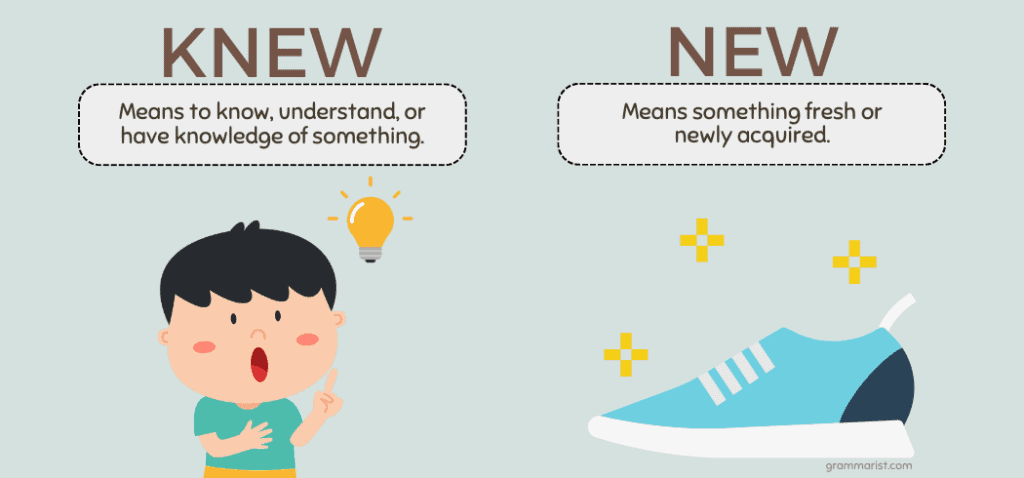Why is it so hard to know when to use the words knew and new? The words sound totally the same but are spelled differently because they’re homophones. But what does that mean, and which one is correct and when? Don’t worry; I’ve got everything covered in this quick guide that explains the difference and shows you how to use either in a sentence.
Is It Knew or New?

That 100% depends on what you’re saying or writing because, while the words sound exactly the same, they have completely different definitions. Knew means to know, understand, or have knowledge of something. New means something fresh or newly acquired.
When written, you can tell them apart by how they’re spelled. But in speech, it’s virtually impossible to tell them apart without context.
Knew Meaning
The word itself is actually a past tense verb of the word know. Basically, both mean that you have knowledge or information about something.
New Meaning
When you buy something, the item is new. But the word is widely used to describe everything from a newborn baby to a new day. When it comes down to it, the word just means anything that is fresh or didn’t exist to you before.
Homophone of Knew
New is the homophone of knew, and vice versa.
Is Knew a Verb?
You bet! It’s the past tense form of the word know. Once you know something, you can then say you knew it. But you can use them interchangeably. Like, I could say, “I knew she was nothing but trouble,” but switching out knew for know won’t work because then it would read as “I know she was nothing but trouble,” which makes the word ‘was’ incorrect because it’s also past tense.
How Do You Spell Knew?
If you’re talking about the knowledge of something, then you’d spell it as knew. But if you’re dealing with something that’s young, fresh, or had never existed to you before, then you’d spell it as new.
Examples of New in a Sentence
- “Check out the new bike that my parents got me for my birthday!”
- “Tomorrow is a new day and a chance to do even better.”
- “My new truck is so much better than that old junk car I used to drive around.”
- “I love the new stadium and all the extra space we have to skate while my parents can do the walking track.”
- “I’m not a fan of the new recipe for that stir-fry; it tastes weird.”
Liverpool new boy Marko Grujic has revealed he has received ‘more offers from girls’ since he signed for the Reds. (The Mirror)
Examples of Knew in a Sentence
- “I just knew I was going to fail that test; it doesn’t matter how much I studied.”
- “He knew I was lying, I could tell, and it tore me up inside.”
- “My mother said she always knew I’d grow up to be a famous author one day.”
- “They all knew who the murderer was long before I figured it out.”
- “I knew it was a bad idea to try and play Monopoly with the whole family.”
But those who knew her say she was not, as some have called her, a “recluse”; she did not eschew the company of others. (Time Magazine)
Don’t Let These Homophones Confuse You
It’s super easy to mix them up. Just remember, the word knew comes from knowledge, and both have a K. If you just keep that in mind, you’ll never get these homophones mixed up again.
